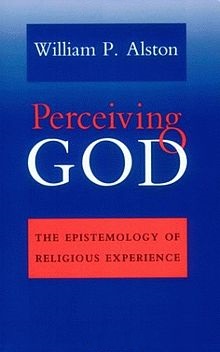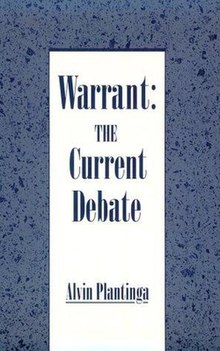
Epistemology, or the theory of knowledge, is the branch of philosophy concerned with knowledge. Epistemology is considered a major subfield of philosophy, along with other major subfields such as ethics, logic, and metaphysics.
Faith and rationality exist in varying degrees of conflict or compatibility. Rationality is based on reason or facts. Faith is belief in inspiration, revelation, or authority. The word faith sometimes refers to a belief that is held without reason or evidence, a belief that is held in spite of or against reason or empirical evidence, or it can refer to belief based upon a degree of evidential warrant.
Faith, derived from Latin fides and Old French feid, is confidence or trust in a person, thing, or concept. In the context of religion, one can define faith as "belief in God or in the doctrines or teachings of religion". According to Merriam-Webster's Dictionary, faith has multiple definitions, including "something that is believed especially with strong conviction," "complete trust," "belief and trust in and loyalty to God," as well as "a firm belief in something for which there is no proof".
Reliabilism, a category of theories in the philosophical discipline of epistemology, has been advanced as a theory both of justification and of knowledge. Process reliabilism has been used as an argument against philosophical skepticism, such as the brain in a vat thought experiment. Process reliabilism is a form of epistemic externalism.
Justification is the property of belief that qualifies it as knowledge rather than mere opinion. Epistemology is the study of reasons that someone holds a rationally admissible belief. Epistemologists are concerned with various epistemic features of belief, which include the ideas of warrant, knowledge, rationality, and probability, among others.
Alvin Carl Plantinga is an American analytic philosopher who works primarily in the fields of philosophy of religion, epistemology, and logic.
The Gettier problem, in the field of epistemology, is a landmark philosophical problem concerning the understanding of descriptive knowledge. Attributed to American philosopher Edmund Gettier, Gettier-type counterexamples challenge the long-held justified true belief (JTB) account of knowledge. The JTB account holds that knowledge is equivalent to justified true belief; if all three conditions are met of a given claim, then we have knowledge of that claim. In his 1963 three-page paper titled "Is Justified True Belief Knowledge?", Gettier attempts to illustrate by means of two counterexamples that there are cases where individuals can have a justified, true belief regarding a claim but still fail to know it because the reasons for the belief, while justified, turn out to be false. Thus, Gettier claims to have shown that the JTB account is inadequate because it does not account for all of the necessary and sufficient conditions for knowledge.
Evidentialism is a thesis in epistemology which states that one is justified to believe something if and only if that person has evidence which supports said belief. Evidentialism is, therefore, a thesis about which beliefs are justified and which are not.
Virtue epistemology is a current philosophical approach to epistemology that stresses the importance of intellectual and specifically epistemic virtues. Virtue epistemology evaluates knowledge according to the properties of the persons who hold beliefs in addition to or instead of the properties of the propositions and beliefs. Some advocates of virtue epistemology also adhere to theories of virtue ethics, while others see only loose analogy between virtue in ethics and virtue in epistemology.

In the philosophy of religion, Reformed epistemology is a school of philosophical thought concerning the nature of knowledge (epistemology) as it applies to religious beliefs. The central proposition of Reformed epistemology is that beliefs can be justified by more than evidence alone, contrary to the positions of evidentialism, which argues that while non-evidential belief may be beneficial, it violates some epistemic duty. Central to Reformed epistemology is the proposition that belief in God may be "properly basic" and not need to be inferred from other truths to be rationally warranted. William Lane Craig describes Reformed epistemology as "One of the most significant developments in contemporary religious epistemology ... which directly assaults the evidentialist construal of rationality."
Philosophical theology is both a branch and form of theology in which philosophical methods are used in developing or analyzing theological concepts. It therefore includes natural theology as well as philosophical treatments of orthodox and heterodox theology. Philosophical theology is also closely related to the philosophy of religion.
Basic beliefs are, under the epistemological view called foundationalism, the axioms of a belief system.
The argument from a proper basis is an ontological argument for the existence of God related to fideism. Alvin Plantinga argued that belief in God is a properly basic belief, and so no basis for belief in God is necessary.
Metaphysical naturalism is a philosophical worldview which holds that there is nothing but natural elements, principles, and relations of the kind studied by the natural sciences. Methodological naturalism is a philosophical basis for science, for which metaphysical naturalism provides only one possible ontological foundation. Broadly, the corresponding theological perspective is religious naturalism or spiritual naturalism. More specifically, metaphysical naturalism rejects the supernatural concepts and explanations that are part of many religions.
The following outline is provided as an overview of and topical guide to epistemology or theory of knowledge, the branch of philosophy concerned with knowledge. The term was introduced into English by the Scottish philosopher James Frederick Ferrier (1808–1864). Epistemology asks questions such as: "What is knowledge?", "How is knowledge acquired?", and "What do people know?"
The evolutionary argument against naturalism (EAAN) is a philosophical argument asserting a problem with believing both evolution and philosophical naturalism simultaneously. The argument was first proposed by Alvin Plantinga in 1993 and "raises issues of interest to epistemologists, philosophers of mind, evolutionary biologists, and philosophers of religion". The EAAN argues that the combined belief in both evolutionary theory and naturalism is epistemically self-defeating. The argument for this is that if both evolution and naturalism are true, then the probability of having reliable cognitive faculties is low. This argument comes as an expansion of the argument from reason, although the two are separate philosophical arguments.
Religious epistemology broadly covers religious approaches to epistemological questions, or attempts to understand the epistemological issues that come from religious belief. The questions asked by epistemologists apply to religious beliefs and propositions whether they seem rational, justified, warranted, reasonable, based on evidence and so on. Religious views also influence epistemological theories, such as in the case of Reformed epistemology.

Perceiving God: The Epistemology of Religious Experience is a 1991 book about the philosophy of religion by the philosopher William Alston, in which the author discusses experiential awareness of God. The book was first published in the United States by Cornell University Press. The book received positive reviews and has been described as an important, well-argued, and seminal work. However, Alston was criticized for his treatment of the conflict between the competing claims made by different religions.
Warranted Christian Belief is a book written by Alvin Plantinga and published in 2000. It constitutes, after Warrant: The Current Debate and Warrant and Proper Function, both published in 1993, the last part of his trilogy on epistemology.
Warrant and Proper Function (1993) is the second book in a trilogy written by philosopher Alvin Plantinga on epistemology.



